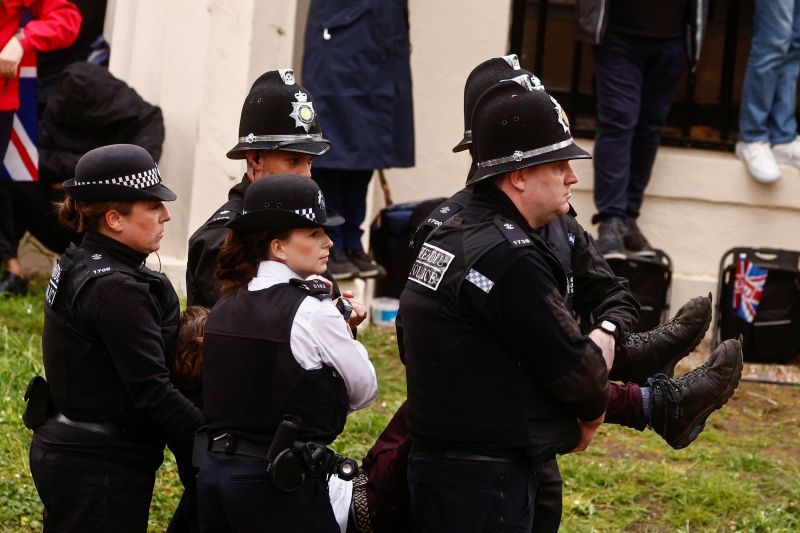The Metropolitan Police has faced criticism for its handling of anti-monarchy protests during the Coronation of King Charles III in London after 64 people were arrested, of whom four were charged with offenses.
Many accused the force of taking a heavy-handed approach toward demonstrators. Several opposition lawmakers and human rights groups have condemned the police’s actions.
Graham Smith, the chief executive of Britain’s largest anti-monarchist group, Republic, was among those arrested. Speaking on BBC Radio 4 he said suggestions that the arrests were necessary was “disgraceful.”
“They stopped us because the law was introduced, rushed in last week, to give them the powers to stop us on any flimsy pretext,” he said Monday.
“That law means we no longer in this country have the right to protest, we only have the freedom to protest contingent on the permission of senior police officers and politicians and it’s my view that those senior police officers were under immense pressure from politicians,” he added.
However, a senior UK government minister defended the actions of the Metropolitan Police during the anti-monarchy protests in London on Saturday, saying officers had to make “tough calls.”
UK culture secretary Lucy Frazer said that, while the right to protest remains “really important” in a democracy, tactics by demonstrators have shifted in recent years to interrupt people going about their daily lives.
Frazer told the BBC the police were tasked with balancing people’s right to protest with overseeing an international event on the world stage.
Thousands gathered in central London on Saturday to celebrate the once-in-a-generation occasion. But it also drew demonstrators, with protesters wearing yellow T-shirts booing and shouting “Not My King” throughout the morning.
Labour lawmaker Chris Bryant posted on Twitter Saturday: “Freedom of speech is the silver thread that runs through a parliamentary constitutional monarchy.”
Jess Phillips, also a Labour lawmaker, said on Twitter: “Our nation and our King is not so fragile as to not be able to take harmless protest of a different view.”
UK director of Human Rights Watch, Yasmine Ahmed, described the police’s actions as alarming and “something you would expect to see in Moscow, not London.”
The MET police statement said the arrests were “for various offences including breach of the peace and conspiracy to cause a public nuisance”, including “religiously aggravated offence”, “possession of class A drugs”, “conspiracy to cause a public nuisance,” “breach of the peace” and “racially aggravated public order offence.”
Defending the force’s actions, Commander Karen Findlay said that, while they “absolutely understand public concern,” police also “have a duty to intervene when protest becomes criminal and may cause serious disruption.”
Members of environmental activist group Just Stop Oil were also arrested on The Mall outside Buckingham Palace, the UK’s PA Media news agency reported, adding that a large group of the protesters were seen in handcuffs.
According to PA, Animal Rising said some of its supporters were apprehended on Saturday while at a training session “miles away from the coronation.” A spokesman for the campaign group, Nathan McGovern, described the arrests as “nothing short of a totalitarian crackdown on free speech and all forms of dissent.”
